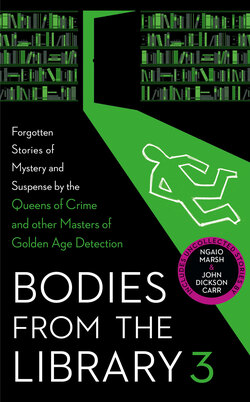Читать книгу Bodies from the Library 3 - Группа авторов - Страница 8
LYNN BROCK
Оглавление‘Lynn Brock’ was one of several pseudonyms used by the Irish writer, Alister McAlister (1877–1943). Born in Dublin, McAlister was educated at Clongowes College, a Jesuit school in County Kildare once attended by James Joyce. After school he gained a scholarship to the Catholic University of Ireland in Dublin and on graduating in 1899 with a First in Ancient Classics, he set about becoming a playwright while working as a clerk at his alma mater. Although McAlister had some success with short stories, his first three playscripts were rejected—one by W. B. Yeats—but perseverance paid off and his first play was presented—as by ‘Henry Alexander’—on 12 May 1905 by Edward Compton’s Comedy Company. A one act comedy, The Desperate Lover is set in a bookshop in the eighteenth century, and its original cast included Compton’s son Montague, later to become rather better known as the novelist Compton Mackenzie.
McAlister was nothing if not bold. After seeing the actor-manager Lena Ashwell perform in London, he sent her The Desperate Lover suggesting she might like to present it. Ashwell was impressed and commissioned a second play from him—the result, a three-act melodrama called Irene Wycherley, opened in 1907 at the Kingsway Theatre in London with Ashwell in the title role. The ‘horribly grim but splendidly acted’ play, credited to ‘Anthony P. Wharton’, was a huge success, even more so when it toured the following year with the celebrated actress Mrs Patrick Campbell in the lead, and the Irish Independent hailed Wharton as ‘a brilliant fellow, a person of intellect, a writer of promise’.
McAlister’s next play was A Nocturne, staged in 1908 as one of a quartet of one-act plays, and it was followed in 1912 by a ‘most delightful comedy’, At the Barn, starring the celebrated singer Marie Tempest. At the Barn was also a success and in 1921 a cinema adaptation appeared under the title Two Weeks. However, his next play—Sylvia Greer—was a flop, which McAlister appears to have anticipated because he did not allow his name to appear in any advertisements or even outside the theatre. In 1913 there was a brief run of a one-act thriller, 13 Simon Street, and in 1915 A Guardian Angel and Benvenuto Cellini.
By this time McAlister was serving in France with the Motor Machine Gun Service of the British Army. He was wounded twice and in 1916, while he was lying in a Dublin hospital, his next play, inspired by the Maybrick case, was staged; the script of The Riddle was co-credited to another writer, Morley Roberts, although he had done little more than edit McAlister’s original script. The production had a strong cast—including the playwright Dion Boucicault as a Machiavellian barrister and, as a woman once accused of murder, the great Irene Vanbrugh. The notices were good but McAlister was unhappy with Roberts’ changes and, around a year later, the play was re-staged in Dublin in its original form, this time credited solely to ‘Anthony P. Wharton’ and with the original title, The Ledbetter Case. McAlister must have been very disappointed that this—the original version of his play—was less well received than The Riddle.
Although Irene Wycherley and other plays continued to be staged, McAlister’s reputation as a playwright was beginning to fade. He therefore began writing fiction again, with short stories appearing in Pearson’s Magazine and the Empire Review. His first novel, Joan of Overbarrow (1921) was a comedic romance—‘If I had to choose between marrying you and dying in a pigsty, I should prefer to die in a pigsty’. Later books were more serious. The Man on the Hill (1923) anticipates the General Strike of 1926 while Be Good, Sweet Maid (1924) is a viciously misogynistic study of a woman novelist. In a lighter vein, Evil Communications (1926) is a series of sketches providing ‘a rollicking study of village life’, and The Two of Diamonds (1926) is a historical romance set in Second Empire France.
In the 1920s, crime fiction was very much considered a lesser branch of literature and for his first mystery, McAlister—then working as a publican in Surrey—adopted a new pseudonym, ‘Lynn Brock’. His first Brock novel, The Deductions of Colonel Gore (1924), introduced Wickham Gore, a retired soldier turned explorer who returns from Africa to discover blackmail and murder among his friends. In an overcrowded market, Colonel Gore was an immediate success. His first case was followed up by a golfing mystery, Colonel Gore’s Second Case (1925), and the extraordinary Colonel Gore’s Third Case: The Kink (1925). Over the next twenty years, McAlister produced four more Colonel Gore books including The Mendip Mystery (1929), its sequel QED (1930) and the multiple murder mystery The Stoat (1940). The Lynn Brock name also appeared on some standalone novels, perhaps the best known being the revenge thriller Nightmare (1932).
At heart McAlister was always a playwright, and he wrote two final plays, presented as by Lynn Brock: in 1929 a farce called Needles and Pins, which received poor reviews; and in 1931, an adaptation of The Mendip Mystery.
One of only two uncollected short stories to feature Colonel Gore, ‘Some Little Things’ was first published in the Radio Times on 21 December 1928. I am grateful to the bookseller and archivist Jamie Sturgeon for drawing it to my attention.
